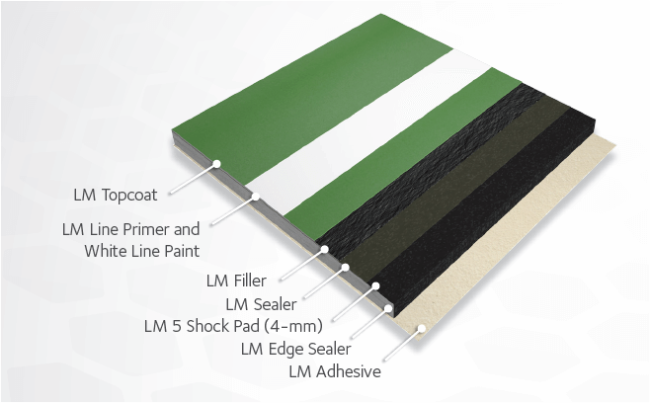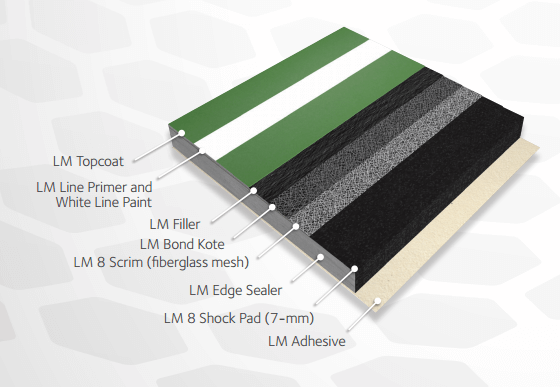Laykold Masters Recycled Tennis Ball Courts
Advanced Polymer Technology and Ace Surfaces created Laykold Masters, the first cushion court with a shock pad that absorbs up to 10,000 recycled tennis balls in a single tennis court. Finally, after a tennis ball has had its last bounce, it can be recycled and used as a cushion tennis court instead of rolling into a landfill.

Laykold Masters 5
With an expected 20+ year lifespan, the LM5 is a perfect solution for new construction. Providing a consistent ball bounce, reliable footing, and long-lasting beauty.
Highlights
Laykold Masters 8
With an expected 20+ year lifespan, the LM8 is a perfect solution for new construction or concealing existing cracks in an otherwise structurally sound tennis court. Providing a consistent ball bounce, reliable footing, and long-lasting beauty.
Highlights

About the Tennis Ball Courts Shock Pad
- Connector.
Tennis Balls
Tennis Balls are collected as part of our Free to Participate Recycling Initiative. The Tennis Balls are ground down to a suitable form so they can then…
- Connector.
Laykold Masters Shock Pads
Tennis Balls along with other recycled materials are incorporated as part of this cutting-edge court systems. Each shock pad is fabricated in a ISO 9001 facility to the custom specifications required for each job site …
- Connector.
Laykold Masters 5 & Laykold Masters 8
The shock pad is then combined with an acrylic surfacing (Masters Color) that is environmentally friendly and contains no heavy metals or solvents. The resulting tennis world class court surface provides for advanced player comfort, consistent ball bounce, reliable footing, and long-lasting beauty.
Why Consider a Laykold Masters 5 or 8
Concrete or Asphalt
“Post-tension” concrete is a common “solution” perceived to reduce cracks over the lifetime of the tennis courts. Asphalt courts commonly crack on seams.
Laykold Masters Cushion Courts
Provide unsurpassed cushion and comfort to players of all ages and levels. As shock pads conceals the appearance of cracking, resurfacing cycles are reduced.
Traditional Clay Courts
Traditionally viewed as soft, but there is little force reduction as”Softness” is by-product of sliding. Daily routine and scheduled maintenance requirements.